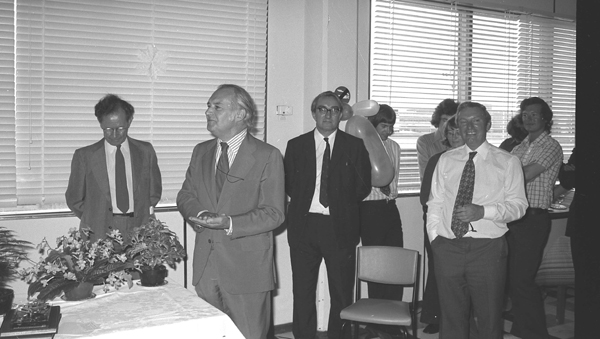

Peter Hall was the main ICL contact to the Atlas Computer Laboratory throughout its life.
Peter Hall spent the war working at the Radar Research Establishment in Malvern for Martin Ryle. Freddie Williams and Tom Kilburn were also there.
Ferranti spent the war taking prototype radar devices and turning them into items which could be mass produced by the Ferranti factories, and, as a result, had built up a special relationship with the Williams/Kilburn team which continued when Freddie Williams and Tom Kilburn moved to Manchester. Peter Hall moved to Ferranti after the war.
In the early days at Manchester, the main collaboration was between Freddie Williams for the University and Brian Pollard for Ferranti. This gradually changed to Tom Kilburn for Manchester and Peter Hall for Ferranti.
Peter Hall was responsible for seconding Ferranti staff to Manchester which helped the university and was of value to Ferranti in getting knowledge back into the company. The arrangement had trust on both sides and, if the University ran out of money and could not afford somebody, he would be put on the Ferranti payroll.

Behind Peter Hall in the above photo in the foreground are Christopher Joliffe, Bob Churchhouse and Jim Hailstone.
Ferranti's committed a significant amount of the Ferranti fortune to the Atlas Project and they were pleased to see a potential customer in Harwell. Peter Hall explained to Jack Howlett that, to order an Atlas, Ferranti needed a contract from the Authority which committed them to over £3 million for a machine which Ferranti could not specify in performance, reliability or delivery date. A contract was arranged, mainly due to the trust between Jack and Peter, for the agreed price, for delivery sometime, of a machine of unspecified performance, or reliability but which performed to the satisfaction of the authority -- which meant Jack Howlett. It enabled the Atlas Laboratory to get off the ground, and Ferranti to establish the Atlas computer in the market place; and importantly rescue some of the Ferranti family's money.
Peter Hall was the key figure in persuading Ferranti to merge its Computer Division into ICT. He realised that success in the computer business depended on a marketing operation and a base of data-processing users that Ferranti did not have and ICT did.
Peter also organised the meeting of Arthur Humphreys with the Ferranti Packard Company in Canada to look at the FP6000. The presentation by Ferranti Packard staff was expertly done and resulted in the expansion of the FP6000 design into a compatible range which became the 1900 series.
Peter Hall continued as the main contact point with the Laboratory throughout its life and, after Jack retired, was responsible for getting Jack to edit the ICL Journal.
Peter Hall became President of the British Computer Society in 1982.
Peter Hall was involved in bringing together the UK computer industry into one major company (ICL), and in getting government bodies to support the UK industry by placing orders for major systems with ICL.
Peter had worked on radar in the war at RRE Malvern, then joined Ferranti and became manager of the electronics department.
In 1959 he was appointed manager of the Ferranti computing department. At the time Ferranti was developing the Atlas and Orion computers, and had a major computer development centre and factory at West Gorton in Manchester.
These were ambitious ventures, and the business needed orders, Peter personally secured the crucial first order for Atlas, to Harwell. Later he made the arrangements with Cambridge University that secured the development of Atlas 2. These were the most advanced computers at the time.
He had a key role in persuading Ferranti to merge its computer department into ICL in 1963, and in persuading ICL to develop the Ferranti FP6000 into the 1900 range of computers, successfully launched in 1964. As the director responsible for the development of large computers, Peter helped transform ICT into the major UK computer company.
Getting the UK government to support the UK computer industry by buying UK computers was vital, particularly to support the large systems development programmes being done at Manchester.
In the late 1960s Peter was given responsibility for government relations and marketing, working with the government body responsible for computer procurement policy (the CCTA), and gained considerable respect from those he worked with. Peter championed the ICL systems and succeeded in getting ICL computers being used in many areas of UK government.
He continued as a director in the new ICL company formed following the merger of ICT and EELM in 1968.
Peter served the BCS as President in 1981/82, and continued as chairman of the BCS Council in 1982/83 when the Duke of Kent was President. Being President is not a sinecure but requires hard work, a considerable time commitment, in effect over four years, an ability to read the signs and a great deal of tact.
Peter had these in abundance. He was always polite, self-disciplined, generous of spirit and dedicated to the Society's aims, guiding it through the preparatory work for it's application for a Royal Charter submitted by his successor.
Peter was proud of the achievements made in Manchester on the development of computers. In 1993 he helped establish the North West Group of the Computer Conservation Society as its first chairman, and was enormously supportive of the project team which carried out the rebuild of the first Manchester computer, the 'Baby' (or SSEM), the rebuild project started in 1994 and was completed for its 50th anniversary in 1998.